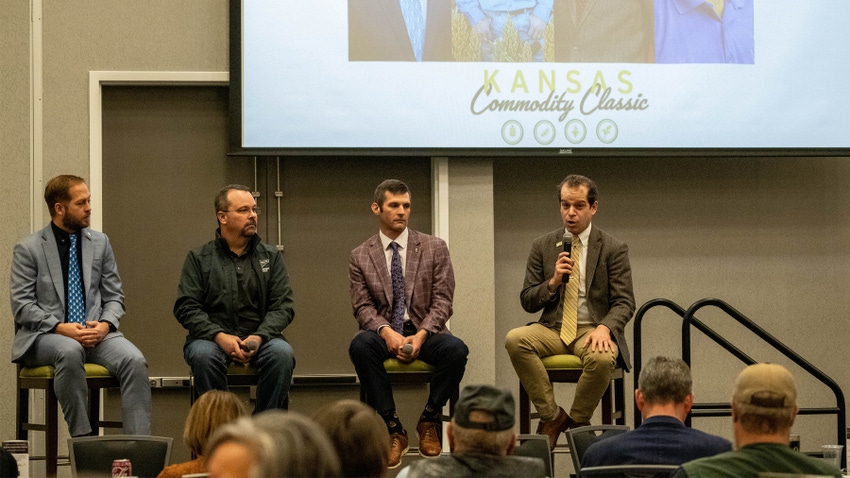
From regulations that could limit how farmers farm, to the need to get a farm bill past the finish line, there’s a lot on the docket for agricultural policy in 2024.
A panel of representatives spoke about policy priorities Jan. 25 at the 2024 Kansas Commodity Classic in Salina, Kan. The panel included Wayne Stoskopf, director, public policy for risk management and tax for the National Corn Growers Association; Chris Tanner, vice president of Kansas Association of Wheat Growers and member of the board of directors for the National Association of Wheat Growers; Craig Meeker, chairman of National Sorghum Producers; and Kyle Kunkler, director of government affairs, American Soybean Association.
Chief on the list of priorities was a new farm bill. The panel agreed that getting the farm in the farm bill, ensuring that it is a usable safety net for farmers in increasingly uncertain times, is critical.
Meeker shared that one of his colleagues testified before the committee that the current safety net is like a tightrope net located 6 inches above a concrete slab, and farmers are walking 15 feet in the air. “And we hit the cement before the net kicks in,” he added.
Stoskopf said the 2024 election is taking a lot of the attention away from getting a farm bill passed this year, and it’s possible that we will see an extension of the current bill into 2025. He encouraged farmers to call their representatives.
Soybeans
Kunkler said soybean farmers are focusing on pesticide and biotech policy developments that could affect how soybean farmers farm in the future. One of the most critical issues they’re facing right now is the EPA’s Vulnerable Species Pilot (VSP), a process to help it become compliant with the Endangered Species Act.
As Kunkler explained it, under the law, EPA has 15 years to re-register every single pesticide active ingredient. Currently, there are 900 active ingredients on the market, and the agency has three years left on its deadline.
The re-registration means that the agency will review the active ingredient and identify any vulnerable species that might be affected by the ingredient’s use, and any mitigation strategies to add to its label.
To get through the backlog, EPA has proposed this VSP, Kunkler explained, where it would lump groups of herbicides and insecticides together and consider their effects, if any, on vulnerable species.
“The short version is that you could be prohibited from using any pesticide on your operation, unless you adopt mitigation or conservation practices that would reduce runoff and spray exposure risk,” Kunkler said.
Those mitigation strategies could affect operations and farmers’ abilities to use the farming methods of their choice, Kunkler said.
“Fewer and fewer folks in D.C. understand how farming works, or are even involved in farming,” Kunkler said. “But, we are not going to make headway if we embrace divisiveness.”
In the end, it’s a matter of educating and continuing to share how decisions made in Washington, D.C., affect farmers on the land.
Wheat
Tanner said wheat groups are focusing on a policy that would tweak crop insurance to separate continuous and fallow production practices. It’s a simple move, but it is a necessary move for anyone who farms where fallow is a necessary tool, he said.
“We’re working on having wheat listed as a harvestable cover crop,” he continued. “That would be advantageous to every commodity on this stage, lower carbon intensity scores and help row crops be more profitable moving forward with carbon trading policies.”
Corn
Stoskopf spoke about the work corn groups are doing to get year-round E15 across the nation. Currently, there’s a patchwork of states that have rules supporting E15, but ultimately, it’s going to take legislation, he said.
He also touched on the Next Generation Fuels Act, and how the National Corn Growers Association is working to remind legislators that ethanol and renewable fuels are already on the ground and working, and we have the production capabilities right now.
He said the issue with Mexico and its rules regarding GM corn imports has been elevated through USMCA appeal channels. However, Mexico’s presidential election this summer may make the situation moot if the new president decides to drop the issue.
And on the conservation front, he said NCGA continues to support locally led, resource-driven conservation measures, and making sure that crop insurance isn’t a barrier to accessing conservation tools.
There’s no one-size-fits-all approach for every grower’s conservation goals, he said, and it’s important that legislation that’s introduced supports growers who are already doing conservation work.
Sorghum
Meeker, fresh from a market development trip with sorghum producers to India, says keeping FMD and MAP funds in the farm bill is critical to opening up and developing markets for U.S. producers.
He explained that market development takes years of building relationships and learning how U.S. crops can fill foreign buyers’ needs. For example, sorghum is growing market share in the pet food industry, and China has the largest growth in its pet-owning population.
“We’re planting trees, the shade of which we may never see,” he said. “My children may see the fruits of our labor in India. China didn’t happen overnight. We need to have boots on the ground.”
About the Author(s)
You May Also Like






